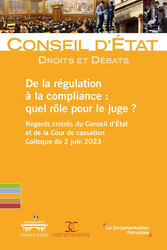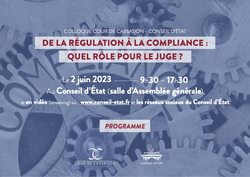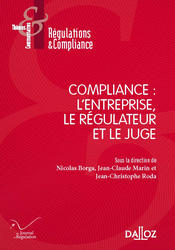Thesaurus : Doctrine

► Full Reference: O. Douvreleur, "Compliance and Judge ruling only on points of Law", in M.-A. Frison-Roche (ed.), Compliance Jurisdictionalisation, series "Compliance & Regulation", Journal of Regulation & Compliance (JoRC) and Bruylant, to be published.
___
► Article Summary (done by the Journal of Regulation): Compliance maintains with the judge complex relations, and even more with the judge ruling only on points of Law (in France, the Court de Cassation in the judicial order, the one who, in principle, does not know the facts that he leaves to the sovereign appreciation of the judges ruling on the substance of the disputes. At first glance, compliance is a technique internalised in companies and the place occupied by negotiated justice techniques leave little room for intervention by the judge ruling only on points of Law
However, his role is intended to develop, in particular with regard to the duty of vigilance or in the articulation between the different branches of Law when compliance meets Labor Law, or even in the adjustment between American Law and the other legal systems, especially French legal system. The way in which the principle of Proportionality will take place in Compliance Law is also a major issue for the judge ruling only on points of Law.
____
________
May 14, 2025
Thesaurus : Soft Law
► Référence complète : Cour de cassation, Renforcer la confiance dans le processus de décision à la Cour de cassation Motivation enrichie et opinion séparée, mai 2025.
____
________
Nov. 26, 2024
Interviews

🌐follow Marie-Anne Frison-Roche on LinkedIn
🌐subscribe to the Newsletter MAFR Regulation, Compliance, Law
🌐subscribe to the Newsletter Surplomb, par MAFR
____
► Full Reference: M.-A. Frison-Roche, "GPA : "L’interdiction de la GPA posée par le Code civil n’existe plus" ("The French Civil Code ban on surrogacy no longer exists"), interview with Olivia Dufour, Actu-Juridique, 26 November 2024
____
💬read the interview (in French)
____
► Presentation of the interview by the journal: "Un simple arrêt de section rendu par la première civile de la Cour de cassation le 14 novembre 2024 peut-il donner plein effet à une "pure convention de GPA" ? Telle est la question que l’on peut se poser à la suite de cette décision. Éléments de réponse avec le professeur Marie-Anne Frison-Roche. ".
____
🕴️M.-A. Frison-Roche, 📕GPA : dire Oui ou dire Non, 2018
____
► Questions posées, réponses apportées :
Actu-Juridique. Question : Un arrêt de section de la première chambre civile de la Cour de cassation rendu le 14 novembre dernier en matière de gestation pour autrui (GPA) a suscité l’émotion. Est-il exact de dire qu’en pratique, suite à cette décision, la prohibition en France de la GPA n’existe plus ?
Marie-Anne Frison-Roche. Réponse. :
A.J. Q. : Quels étaient les faits de l’espèce et en quoi diffèrent-ils des autres affaires ?
MaFR. R. : O
A.J. Q. : L’Europe avait-elle déjà pris position sur la GPA et si oui, par quels textes et dans quel sens ?
MaFR. R. : En Europe, c'est la jurisprudence de la CEDH qui en 2014 (arrêts Mennesson) est venu briser la jurisprudence française pour imposer que la filiation de l'enfant né d'une GPA réalisée à l'étranger dans un pays où la GPA est licite puisse être établie à l'égard du père dont les gamètes avaient été utilisées. Il ne restait plus alors qu'à procéder à l'adoption par le conjoint de celui-ci. La législation interne ne fût pas pour autant modifiée mais le fonctionnement de l'état-civil permet de rendre inefficace la prohibition. Mais c'était à la fois dire Non et Oui... L'enjeu fût donc de modifier les textes, soit pour exclure la GPA plus fortement, soit pour l'admettre plus ouvertement.
A.J. Q. : En quoi la technique juridique utilisée pour faire reconnaître cette GPA en France était-elle différente de ce que l’on connait usuellement ?
MaFR. R. : C
A.J. Q. : Quelle est la portée de cet arrêt ?
MaFR. R. : I
A.J. Q. : Qu’en est-il du rapport avec l’adoption ?
MaFR. R. : S
A.J. Q. : Le rapporteur n’a-t-il pas évoqué une possibilité de déguiser une adoption illicite à l’étranger sous une GPA ?
MaFR. R. : S
________

Nov. 21, 2024
Organization of scientific events
► Full Reference: M.-A. Frison-Roche, coordination of the conference Dans l’espace de justice, les pratiques juridictionnelles au service du futur (In the Space of Justice, Jurisdictional Practices at the Service of the Future), in Cour de cassation, cycle of conferences "Penser les pratiques juridictionnelles au service d’un espace de justice" ("Thinking jurisdictional practices in the service of a Space of Justice"), 21 November 2023, 4pm.-6.30pm.
____
► General presentation of the conference: The conception of the conference takes account of the fact that the event comes almost last in the cycle. Previous themes have been ‘jurisdictional practices’ insofar as they are ‘at the service of a European area of justice’ (February 2023), ‘enlightened’ (March 2023), ‘attractive’ (June 2023), ‘interactive’ (September 2023) and ‘peacemaking’ (December 2023).
The conference's problematic stems from an observation: today, judges are facing claims that relate directly to the future. Of course, in their traditional office judges deal with the future of disputed situations, but today it is the future of systems in their entirety that is sometimes submitted to them through a dispute or a request, and a solution is sought. The possible presence of future generations is just one sign of this.
The space of justice may seem unsuitable for such gigantic trials, both in terms of their subject matter and their impact.
No doubt a distinction must be made between judges, and some judges may seem more familiar than others with the systemic issues that the future brings with it. Perhaps the judge's prudence should lead him not to use his power over the future, for example in the handling of sanctions, forgetting that the future by its very nature contains an element of the unknown, a fundamental prudence which the principle of the legality of offences and penalties expresses.
But the future is not a blank page either and the judge, without inventing it, can check the coherence of those who write the law, if he is a constitutional judge, those who write contracts and commitments, if he is a civil or commercial judge. In order to fulfil their office, which the stakeholders are demanding, judges need to think about and deal with this new systemic object before them: the future.
To understand it, judges draw on available jurisdictional practices, adjust others, and link them together using new methods.
____
🧮read the programme of the cycle of conférences in 2023 (in French)
________
June 20, 2024
Thesaurus : Doctrine
► Référence complète : V.-O. Dervieux, "Israël à Eurosatory : la justice éparpillée « façon puzzle » ?", Actu-Juridique.fr, 20 juin 2024.
____
April 4, 2024
Publications

🌐follow Marie-Anne Frison-Roche on LinkedIn
🌐subscribe to the Newsletter MAFR Regulation, Compliance, Law
____
► Full Reference: M.-A. Frison-Roche, "Le rôle du juge dans le déploiement du droit de la régulation par le droit de la compliance" ("Synthesis: The role of the Judge in the deployment of Regulatory Law through Compliance Law"), Synthesis in Conseil d'État (French Council of State) and Cour de cassation (French Court of cassation), De la régulation à la compliance : quel rôle pour le juge ? Regards croisés du Conseil d'Etat et de la Cour de cassation - Colloque du 2 juin 2023, La Documentation française, "Droits et Débats" Serie, 2024, pp. 173-182
____
____
🚧read the bilingual Working Paper which is the basis of this article, with additional developments, technical references and hyperlinks
____
► Presentation of this concluding article: It is remarkable to note the unity of conception and practice between professionals who tend to work in administrative jurisdictions and professionals who tend to work in judicial jurisdictions: they all note, in similar terms, an essential movement: what Regulatory Law is, how it has been transformed into Compliance Law, and how in one and even more so in the other the Judge is at the centre of it.
Judges, as well as Regulators and European officials, explain this and use different examples to illustrate the far-reaching changes it brings to the Law and to the companies responsible for increasing the systemic effectiveness of the rules through the practice and dissemination of a Culture of Compliance.
The role of the judge participating in this Ex Ante transformation is renewed, whether he/she is a judge of Public Law or a judge of Private Law, in a greater unity of the legal system.
____
► English Summary of this article: The tug-of-war between 'Compliance' and 'conformity', which is exhausting us, obscures what is essential, i.e. the great novelty of a branch of law that assumes a humanist vision expressing the ambition to shape the future so that it is not catastrophic (preventing systems from collapsing), or even better (protecting human beings in these systems).
The article begins by describing the emergence of Compliance Law, as an extension of Regulatory Law and going beyond it. This new branch of law takes account of our new world, brings its benefits and seeks to counter these systemic dangers so that human beings could be their beneficiaries and are not crushed by them. This branch of Ex Ante Law is therefore political, often supported by public Authorities, such as Regulatory Authorities, but today it goes beyond sectors, as shown by its cutting edge, the Obligation of Vigilance.
The "Monumental Goals" in which Compliance Law is normatively anchored imply a teleological interpretation, leading to an "empowerment" of the crucial operators, not only States but also companies, responsible for the effectiveness of the many new Compliance Tools.
The article goes on to show that Judges are increasingly central to Compliance Law. Lawsuits are designed to make companies more accountable. In this transformation, the role of the judge is also to remain the guardian of the Rule of Law, both in the protection of the rights of the defence and in the protection of secrets. Efficiency is not what defines Compliance, which should not be reduced to a pure and simple method of efficiency, which would lead to being an instrument of dictatorship. This is why the principle of Proportionality is essential in the judge's review of the requirements arising from this so powerful branch of Law.
The courts are thus faced with a new type of dispute, of a systemic nature, in their own area, which must not be distorted: the Area of Justice.
____
📝read article (in French)
________
Oct. 18, 2023
Thesaurus : 02. Cour de cassation
July 5, 2023
Interviews

♾️follow Marie-Anne Frison-Roche on LinkedIn
♾️subscribe to the Newsletter MAFR Regulation, Compliance, Law
____
► Full Reference: M.-A. Frison-Roche et A. Seban, "Compliance : les cours suprêmes s’emparent de la question de ses enjeux juridictionnels" ("Compliance : the Supreme Courts take up the issue of its jurisdictional implications"), interview with Olivia Dufour, Actu-Juridique, 5 July 2023.
____
💬read the interview (in French)
____
► Presentation of the interview by the journal (in French): "Le 2 juin dernier s’est tenu au Conseil d’État un colloque fondateur sur le rôle du juge dans la compliance. Le professeur Marie-Anne Frison-Roche et le conseiller d’État Alain Seban, qui ont tout deux contribué aux débats, ont accepté de commenter les principaux enseignements des travaux de cette journée."
____
► Questions asked (in French):
- Le colloque « De la régulation à la compliance, quel rôle pour les juges » qui s’est tenu au Conseil d’État le 2 juin dernier a rassemblé juges civils et administratifs. En quoi le juge administratif est-il concerné par la compliance qui semble plutôt une affaire d’entreprises et donc de justice civile et commerciale ?
- Vincent Vigneau, président de la chambre commerciale de la Cour de cassation rappelle que la compliance a plutôt vocation à éviter le juge en se situant ex ante, pourtant on découvre que le juge lui-même accepte de plus en plus de se prononcer en ex ante… qu’en est-il ?
- Quel peut donc être le rôle du juge dans la compliance ? Peut-il contribuer à faire émerger un droit de la compliance et à l’harmoniser ?
- François Ancel semble considérer que le rôle juge va devoir adapter son office à la compliance, il évoque trois concepts : téléologique, soutenabilité et efficacité…
- Le juge dispose-t-il en l’état de tous les outils nécessaires ? Si tel n’est pas le cas, que faut-il créer ?
- En quoi le dialogue des juges, civil/administratif, national/européen, national/international, est-il important ?
- Que veut dire F. Ancel quand il déclare que le juge doit évoluer du constat à la trajectoire ?
- Existe-t-il des domaines où la compliance entre en conflit avec des principes processuels, par exemple le principe de légalité des peines ?
- En quoi la notion de « buts monumentaux », que vous avez créée en 2016, a-t-elle trouvé sa place dans le droit ?
________
June 2, 2023
Conferences

🌐follow Marie-Anne Frison-Roche on LinkedIn
🌐subscribe to the Newsletter MAFR Regulation, Compliance, Law
____
► Full Reference: M.-A. Frison-Roche, Le rôle du Juge dans le déploiement du Droit de la Régulation en Droit de la Compliance (The role of the Judge in the deployment of Regulatory Law in Compliance Law), in Conseil d'État (French Administrative Supreme Court) and Cour de cassation (French Judiciaire Supreme Court of cassation), De la Régulation à la Compliance : quel rôle pour le Juge ? ("From Regulatory to Compliance : what role for the judge?"), speech constituting the "closing session" of the bi-annual joint symposium of the two High Courts, held at the Conseil d'Etat, Salle d'Assemblée générale, 2 June 2023.
The event was held in French.
____
🧮See the full programme of this event (in French)
____
🎥watch the interview given about the conclusion, done after the speech (in French)
____
🧮read the general programme of the manifestation (in French)
____
📚read the bibliographical dossier du participant. (participant's file made in French)
___
🎥watch the general introductory speechs of Didier-Roland Tabuteau, Vice-Président du Conseil d'Etat, de Christophe Soulard, Premier Président de la Cour de cassation, and of François Molins, Procureur général près la Cour de cassation ; and the interventions in the first session devoted to the path from the Regulatory to the Compliance with Marie-Anne Barbat-Layani, présidente de l'AMF, Jean-Yves Ollier, conseiller d'Etat, Daniel Calleja-Crespo, directeur général du service juridique de la Commission européenne andChristine Guegen, , première avocate générale de la chambre commerciale de la Cour de cassation
____
🎥watch the speechs in the second session devoted to the office of the judge with Vincent Vigneau, président de la chambre commerciale de la Cour de cassation, François Ancel, conseiller à la première chambre civile de la Cour de cassatin, Astrid Mignon-Colombet, avocate à la Cour, Lucien Rapp, professeur à Toulouse-Capitol and Alain Seban, conseiller d'Etat ; the speechs of the third session dedicated to the Compliance new frontiers, with Christophe Chantepy, président de la section du contentieux du Conseil d'Etat, Roch-Olivier Maistre, président de l'Arcom, Paul Nihoul, juge au Tribunal de l'Union européenne, Jean-François Bohnert, procureur de la République financier, Joëlle Tolédano, professeure émérite à Dauphine ; the final session with Marie-Anne Frison-Roche
____
🎥watch this final speech by Marie-Anne Frison-Roche, which formed the closing session of the event
____
🚧read the bilingual Working Paper used as basis for the article to be published later
____
____
► English presentation of this general conclusion: Having a definition of Compliance Law in mind, a definition around which there still seems to be so much dispute, is not required to understand that this Law is what will enable us to enter and deal with a new world and if this subject is so fascinating to young people who want to become lawyers, prosecutors, regulators or judges, even though they are not taught this subject, it is because they have understood that with Compliance Law they will be able to actively participate in this new world and build it. This is the way we want it to take it, with force and courage in a sort of collective adventure. In this way, the Judges have a monumental role to play, which is at the very heart of Compliance Law.
They will necessarily be so because demands and claims will converge on them from all sides, from Internet users, consumers, investors, associations and companies, and the Judge will have to respond. This has already started and is only just beginning. Judges must be prepared.
Four expectations are emerging as to what their role should be.
Firstly, judges must persist in their role as guardians of the Rule of Law, in a Compliance Law impregnated with technologies (algorithms) that could be described as insensitive.
Secondly, beyond this vital role as guardian of the Rule of Law, the Judge has a new role in the extraordinary deployment of Compliance Law, which is measured in terms of the novelty of the normative control it exercises, the commitments it supports, the remedies it finds and the sustainability it reinforces.
Thirdly, in the natural space of justice, the judge responds to parties who make claims of compliance, both as plaintiff and defendant, because the causes of compliance are systemic causes that deserve a new jurisdictional treatment.
Fourthly, given the novelty and scope of this innovative approach, all judges must converge in terms of content, qualifications, and methods if they are both to continue their traditional role as guardians of the Rule of Law and to be able to endure their new role, a dialogue in which they have so much to contribute to each other.
________
May 29, 2023
Newsletter MAFR - Law, Compliance, Regulation

♾️suivre Marie-Anne Frison-Roche sur LinkedIn
♾️s'abonner à la Newsletter MAFR Regulation, Compliance, Law
____
► Référence complète : M.-A. Frison-Roche, "Compliance-Vigilance-Régulation : que feront les juges demain ? Juges administratif, civil, pénal, commercial, européen, etc. Colloque 2 juin 2023", Newsletter MAFR Law, Compliance, Regulation, 29 mai 2023.
____
📧Lire par abonnement gratuit d'autres news de la Newsletter MAFR - Law, Compliance, Regulation
____
🔴 Ce que les juges ont à nous dire sur la Compliance et la Régulation (2 juin 2023)
Chacun perçoit que les juges sont très puissants dans le Droit de la compliance, par exemple dans le numérique ou en matière de vigilance. Ils le sont aujourd'hui, le seront encore plus demain. Mais comment vont-ils exercer cette puissance, comment conçoivent-ils leur rôle, comment vont-ils exercer leur office face aux régulateurs, aux entreprises, aux personnes impliqués dans des systèmes technologiques qui risquent de nous dépasser ? Le 2 juin 2023 le Conseil d'État et la Cour de cassation se réunissent pour discuter et formuler le rôle du juge dans ce passage qui s'opère du Droit de la régulation au Droit de la compliance. J'attends d'apprendre à travers ce que je vais écouter toute la journée et explicite ici le contenu, les enjeux et les modalités d'inscription de ce colloque conçu par nos deux Hautes juridictions.
____
📧lire l'article ⤵️
Feb. 2, 2023
Thesaurus : Doctrine

► Full Reference: O. Douvreleur, "Compliance et juge du droit" ("Compliance and Judge ruling only on points of Law"), in M.-A. Frison-Roche (ed.), La juridictionnalisation de la Compliance, coll. "Régulations & Compliance", Journal of Regulation & Compliance (JoRC) and Dalloz, 2023, p. 465-471.
____
📕read a general presentation of the book, La juridictionnalisation de la Compliance, in which this article is published
____
► Summary of the article (done by the Journal of Regulation & Compliance): Compliance maintains with the judge complex relations, and even more with the judge ruling only on points of Law (in France, the Court de Cassation in the judicial order, the one who, in principle, does not know the facts that he leaves to the sovereign appreciation of the judges ruling on the substance of the disputes. At first glance, compliance is a technique internalised in companies and the place occupied by negotiated justice techniques leave little room for intervention by the judge ruling only on points of Law
However, his role is intended to develop, in particular with regard to the duty of vigilance or in the articulation between the different branches of Law when compliance meets Labor Law, or even in the adjustment between American Law and the other legal systems, especially French legal system. The way in which the principle of Proportionality will take place in Compliance Law is also a major issue for the judge ruling only on points of Law.
________
July 7, 2021
Thesaurus : Soft Law
Référence complète : Cour de cassation, Rapport de la Commission de réflexion sur la Cour de cassation 2030, juillet 2021.
_____
Nov. 25, 2020
Thesaurus : 02. Cour de cassation
Full reference: Cour de Cassation, Chambre criminelle, 25th of November 2020 (18-86.955), Decision n°2333, société Iron mountain France SAS
Read the press release from the Cour de Cassation (in French)
Read the explication note from the Cour de Cassation (in French)
Summary of the decision
In this decision constituting a case law reversal, the Chambre criminelle of the Cour de Cassation decides that the firm which absorbs the one to which are imputable facts which can receive a penal qualification leading to penalties of fines has the aptitude to answer penally.
The decision precises that this reversal is applicable only to future cases, to respect the principle of predicability, except if this merging was operated only to escape from criminal responsibility of moral persons.
This case is an example of the use of Criminal Liability Law as an incentive.
Sept. 10, 2020
Newsletter MAFR - Law, Compliance, Regulation

Full reference: Frison-Roche, M.-A., Responding to an email with "serious anomalies",transferring personal data, blocks reimbursement by the bank: French Cour de cassation, July 1st 2020, Newsletter MAFR - Law, Compliance, Regulation, 10th of September 2020
Read by freely subscribing other news of the Newsletter MAFR - Law, Compliance, Regulation
Summary of the news
"Phishing" is a kind of cyber criminality aiming to obtain, by sending fraudulent emails which look like to those sent by legitimate organisms, recipient's personal information in order to impersonate or steal him or her. As it is difficult to find the authors of "phishing" and to prove their intentionality in order to punish them directly, on mean to fight against "phishing" could be to entitle banks to secure their information network and, to accompany this obligation with a strong incentive, to convict them to reimburse the victims in case of robbery of their personal data.
In 2015, a client victime of this kind of fraud asked to his bank, the Crédit Mutuel, to reimburse him the amount stole, what the bank refused to do on the grounds that the client committed a fault, transferring its confidential information without checking the email, however grossly counterfeit. The Court of first instance gave reason to the client because although he committed this fault, he was in good faith. This judgment was broken by the Chambre commerciale de la Cour de cassation (French Judicial Supreme Court) by a decision of 1st of July 2020 which states that this serious negligence, exclusive of any consideration of good faith, justifies the absence of reimbursement by the bank.
___
From this particular case, we can draw three lessons:
- The Cour de Cassation states that good faith is not a salient criterion and that, as the bank must react when a banking account is objectively abnormal, the client must react face to an obviously abnormal email.
- The Cour de Cassation describes the repartition of proof burden. Proof obligations are alternatively distributed between the bank and its client. First, the bank must secure its information network but, secondly, the client must take every reasonable measure to preserve its safety. It results from this that, if the email seems normal, phishing damages must be supported by the bank, and more generally of by the firm, while if the email is obviously abnormal, they must be supported by the client, but the burden to prove the abnormality of the email must be supported by the firm and not by the client.
- Such a proof system shows that Compliance Law includes a pedagogic mission by educating each client in order to he or she would be able to distinguish among his or her emails, those which are normal and those which are obviously suspect. This pedagogic dimension, with the legal consequences associated to it, will not stop to spread.
______
Aug. 21, 2020
Newsletter MAFR - Law, Compliance, Regulation

Full reference: Frison-Roche, M.-A., Being obliged by Law to unlock telephone is not equivalent to self-incrimination: Cour de cassation, Criminal Chamber, Dec. 19, 2019, Newsletter MAFR - Law, Compliance, Regulation, 21st of August 2020
Read by freely subscribing the other news of the Newsletter MAFR - Law, Compliance, Regulation
Summary of the news
The Cour de Cassation (French Supreme Judicial Court) made a decision on 19th of December 2019 about a case concerning a refusal to communicate his mobile phone's unlock code to the police while the police found him with a significant quantity of narcotic and a lot of cash and that there was a certain probability that this mobile phone get proofs of culpability of its owner. The individual was indicted not for narcotic trafficking but for not having communicate its unlock code which constitute an offense to article 434-15-2 of code pénal, from the loi du 3 juin 2018 renforçant la lutte contre la criminalité organisée, et le terrorisme et leur financement (law reinforcing organized crime, terrorisme and their financing).
The accused invokes before the court its right to not incriminate oneself. Indeed, the configuration face to policemen was such that if he refused to communicate its unlock code, he will be punished because of this obligation to communicate his code and that if he accepted, he will also be sanctioned because of the proofs contained into the mobile phone. Such a configuration therefore offered him no alternative to confessing, which is contrary to the European Convention on Human Rights and to European and national jurisprudence.
Face to such a case, the Cour de Cassation chose to segment the information and proposed the following solution: if the researched information cannot be obtained regardless of the suspect willingness, it is not possible to constraint this person to communicate this information without violating its procedural rights, but if the information can be obtained regardless of the suspect willingness then the individual is obliged to communicate his code. In the current case, as it was possible for policemen to obtain information contained in the phone by technical means, longer but existent, then the refuse of communication of the unlock code by the suspect constitute an obstruction that should be sanctioned.
Such a decision is an exemple of the conciliation by the judge of two fundamental but contradictory "monumental goals" of Compliance Law: transparency of information towards public authorities and very sensible personal data protection.
To go further, read Marie-Anne Frison-Roche's working paper: Rethinking the world from the notion of data
May 22, 2019
Thesaurus : 02. Cour de cassation
Référence complète : Cass. com., 22 mai 2019, n°17-13565, in Le devoir de loyauté de l'administrateur d'un groupe de sociétés, Aranda Vasquez, A., Petites Affiches, n°38, février 2020, pp. 14-18.
La chambre commerciale de la Cour de cassation a précisé le périmètre du devoir de loyauté des administrateurs dans un groupe de sociétés. Dans un arrêt en date du 22 mai 2019, la Cour de cassation rappelle que l'exercice du droit de vote des administrateurs est en principe libre. Toutefois, la haute juridiction de l'ordre judiciaire précise que dans le cas d'un groupe de sociétés, le conseil d'administration de la filiale doit voter conformément aux résolutions adoptées par le conseil d'administration de la société-mère, sauf lorsque ces dernières sont contraires à l'intérêt social de la filiale.
June 27, 2018
Thesaurus : Doctrine

Référence complète : L'ENA hors les murs, Le droit et la justice aujourd'hui. Et demain ?, n°481, juin 2018, 111 p.
Consulter la présentation de l'article de Marie-Anne Frison-Roche, Le Juge, le Régulateur et le Droit.
May 30, 2018
Thesaurus : 02. Cour de cassation
May 22, 2018
Thesaurus : Doctrine

Référence complète : Marin, J.-Cl., La compliance, un progrès, in Borga, N., Marin, J.-Cl. et Roda, J.-Cl. (dir.), Compliance : l'entreprise, le régulateur et le juge, Série Régulations & Compliance, Dalloz, 2018, p. 15 à 19.
Lire une présentation générale de l'ouvrage dans lequel est publié l'article.
Consulter les autres titres de la Série dans laquelle est publié l'ouvrage.
Feb. 22, 2018
Thesaurus : Doctrine

Complete reference : Aranda Vasquez, A., Affaire Generali : la Cour de cassation précise les caractéristiques de l'obligation, in Petites affiches, février 2018, n° 39, pp.12-15.
"The Generali case is experiencing a new episode. The Court of Cassation has clarified the essential characteristics of the obligation. It is reverting to the position of the judgment of the Paris Court of Appeal of June 21, 2016 (n ° 15 / 00317), by deciding that the reimbursement of the nominal amount is not an essential characteristic of the obligation. The highest court of the judiciary thus sheds light on the matter. "
Sciences-Po students can consult the article via the Drive, "MAFR- Regulation & Compliance" folder
Jan. 19, 2017
Hearings by a Committee or Public organisation

► bi : M.-A. Frison-Roche, Le droit à propos de la pratique de la GPA. Résolutions des cas et positions de principe, intervention devant le groupe plénier du Comité Consultatif National d'Éthique (CCNE), 19 janvier 2017.
____
► Résumé de l'intervention : Le fait pour une femme de porter un enfant et de le remettre à la naissance à un couple, dont l'homme est le plus souvent le père biologique, est une pratique qui remonte à des temps si anciens que le droit romain avait réglé déjà les difficultés juridiques qui en résultent. Puis la pratique avait si ce n'est disparu mais ne s'était pas développée. Ces faits restaient en marge d'un droit qui pouvait demeurer silencieux. Jusqu'à ce qu' un médecin, en France, et sous couvert d'une association "Les cigognes", propose à des jeunes filles de devenir disponibles pour que le désir d'enfants trouve une voie de concrétisation. Le marché par l'offre était né. Ce ne fût pas le Législateur qui réagit, trop lent, trop lourd, trop abstrait. Ce fût le procureur, qui réagit et saisit le juge.
Car c'est avant tout affaire de construction de marché par l'offre, une offre faite à l'égard de personnes malheureuses que l'on persuade qu'ils sont par avance des "parents" du seul fait qu'ils désirent l'être. Un marché que l'on construit par un produit qui est l'humain, que l'on produit par une commodité qui est le corps des femmes, tant qu'on n'a pas construit une machine permettant de s'en passer.
Ainsi, les juges ont été en premier. Et on répondait nettement. "A la française", c'est-à-dire par principe. Saisis par principe, ils ont répondu par principe. En 1991. Et ce principe fût simple : Non. Le fondement fût aussi très simple : les femmes sont des êtres humains qui sont donc des fins en soi et non des moyens. Les enfants sont des êtres humains, qui ne peuvent être engendrés à seule fin d'être cédés (même gratuitement). Le Législateur le suivit par les lois de "bioéthique". Le principe est intangible. Le temps, les pratiques, la variété des cas, des mœurs et des pays, ne font rien à l'affaire.
Mais les entreprises avaient lancé la puissance du marché, qui est la "loi du désir". Et qui ne peut se développer elle-même que par le Droit.
Un droit qui a été d'une toute autre nature, bien que lui aussi judiciaire. Un droit de Common Law. Il ne s'agit pas de dire qu'il soit moins bien ou mieux, mais il est différent. Il s'agit de ne pas évoquer de "principe" mais de repérer dans la "situation" du cas concret présenté au juge les "intérêts" et de faire la "balance des intérêts", ce qui est le reflet de ce qui s'opère sur un marché efficient, le droit de Common Law étant la référence pour l'Analyse économique du droit, inventé à l'Université de Chicago dans les années 1960.
Au Royaume-Uni et aux États-Unis, notamment en Californie, l'idée a donc été de veiller à l'équilibre entre les intérêts concrets des parties à l'arrangement. Pas moins, mais pas plus. Est alors repris un raisonnement de droit économique, c'est-à-dire un raisonnement qui mêle droit des contrats, procédure et contrôle a priori et a posteriori du juge : comme il faut veiller à l'équilibre entre les intérêts, c'est un raisonnement de "droit de la régulation".
Un consentement éclairé, une rencontre des consentements, un lien de bonne qualité, un juge ou une autorité publique veillant à ce que les intérêts soient préservés ; les intérêts de l'enfant prévalant sur les autres s'il y a conflit.
Les deux raisonnements auraient pu ne pas communiquer. Les personnes vivant dans des pays de Civil Law vivant sous le principe de l'indisponibilité des personnes, y compris à elles-mêmes, tandis que les personnes vivants dans des pays de Common Law vivent sous le mécanisme du désir et du consentement, le juge veillant à l’équilibre des intérêts. Si les personnes veulent vivre sous la loi du désir, il leur suffit d'aller vivre en Californie.
Mais les entreprises n'ont pas voulu en rester là. Et c'est alors que les juges ont été saisis, non plus pour que le Droit arrête la GPA, pour que le premier raisonnement, de principe, l'arrête d'un trait, à la demande du ministère public, mais au contraire pour que le second raisonnement, casuistique, grignote petit à petit, à la demande des intéressés, le principe, par pragmatisme, pour régler des questions de transcription, de papier, etc.
Car les entreprises proposant de satisfaire le désir d'un nouveau-né biologique avec un lien de filiation incontestable sont en train d'utiliser le droit - c'est avant toute chose une affaire juridique - pour permettre d'aller prendre un lien de filiation efficace. Il est essentiel de mesurer comme cela s'est passé et à quel point le droit européen et français sont fondamentalement différents du droit américain et britannique, car pour l'instant les premiers sont construits sur la biologie et donc sur le lien paternel, alors que les seconds sont construits sur la volonté et le lien de fait. Le marché de la GPA ne peut prospérer - régulé ou non - que sur le second modèle, qui est proposé à toutes les juridictions et tous les législateurs par les entreprises.
Il convient d'exposer les décisions qui illustrent cela et qui sont en cours d'adoption (I). Cela permet de mesurer les questions qui se posent, casuistiques et de principes, car le Droit a toujours mêlé la dimension concrète, voire triviale des situations en cause et les principes qui y sont impliqués (II).
____
lire les développements ci-dessous
Dec. 16, 2016
Publications

Référence générale : Frison-Roche, M.-A., Quand un simple décret remet en cause la séparation des pouvoirs, Le Monde, 16 décembre 2016.
Un décret du 5 décembre 2016 d'apparence anodine et technique appelle d'un nouveau nom l'inspection des services judiciaires. Mais ce faisant et sans consultation, il y soumet désormais la Cour de cassation, alors qu'il était d'usage dès l'origine de l'y soustraire. Au moment où celle-ci entend conforter de droit son statut de fait de "Cour suprême". L'autorité de la justice est faite avant tout de symbole. C'est ainsi symboliquement que la Cour de cassation est ramenée à n'être qu'une juridiction toute ordinaire, ni suprême ni indépendante, par un texte techniquement si bas - un simple décret - qu'on ne peut atteindre le Conseil constitutionnel. Pourtant c'est la séparation des pouvoirs, qui protège le judiciaire contre l'emprise du politique, qui est ici atteint. La concentration des pouvoirs, qui tente toujours un des pouvoirs est pourtant le socle de l'État de droit.

Dec. 15, 2016
Publications

Ce working paper a servi de base à un article publié dans le journal Le Monde du 16 décembre 2016.
Par un décret du 5 décembre 2016, il est mis fin à un usage qui préservait la Cour de cassation du contrôle exercé par les services de l'Inspection judiciaire. C'est une atteinte, d'apparence anodine mais profonde, à la séparation des pouvoirs, socle constitutionnel de notre État de droit et de notre démocratie.
Lire ci-dessous.
Aug. 10, 2015
Blog

Pour les comprendre, on peut recourir à la technique traditionnelle consistant à en rechercher le sens, la valeur et la portée.
Pour les apprécier, on peut les lire d'une façon politique, consistant à se demander si la Haute Juridiction n'a pas pris la place du Législateur, jeu de pouvoirs.
Mais si la voie pour lire sous les quelques lignes qui composent ces deux arrêts n'était pas plus simplement encore de se reporter à l'audience qui s'est tenue le 19 juin 2015 ?
D'une façon plus générale, même devant la Cour de cassation les audiences sont instructives.
Celle du 19 juin 2015
Il convient d'y prendre au passage une leçon de rhétorique. Rhétorique où l'habilité fût si grande dans ce qui était dit, autour de la proposition du Procureur général de vérifier la réalité biologique du lien entre l'homme et l'enfant qu'il déclenche comme son fils et sa fille. Rhétorique qui attend son apogée en ce que jamais ne fût discutée la solution européenne de donner effet aux convention de GPA, qui ne fût contestée ni par le Procureur général ni par l’État français qui choisit de se taire.
Sous couvert d'opposition, voire d'éclats, ce fût en réalité une unisson qui marqua une audience où aucune voix n'a soutenu le principe d'indisponibilité des corps, le fait que les femmes ne sont pas à vendre et les enfants ne peuvent être cédés. En sortant de l'audience, le sort des femmes et des enfants était scellé.
Pour une conférence faite au sortir de cette audience, Frison-Roche, M.-A.,
July 3, 2015
Interviews

Référence complète : Frison-Roche, M.-A., Les enfants ne sont pas à vendre, Interview par Agnès Leclair, Le Figaro, 3 juillet 2015.
Lire l'interview directement sur le site du journal.
